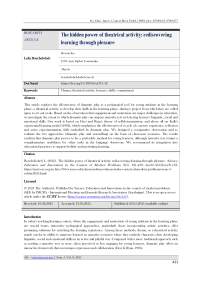The hidden power of theatrical activity: rediscovering learning through pleasure
Автор: Leila Bouchebcheb
Журнал: Science, Education and Innovations in the Context of Modern Problems.
Статья в выпуске: 8, 2025 года.
Бесплатный доступ
This article explores the effectiveness of dramatic play as a pedagogical tool for young students in the learning phase, a theatrical activity, to develop their skills in the learning phase, during a project from which they are called upon to act out a tale. Based on the observation that engagement and motivation are major challenges in education, we investigate the extent to which dramatic play can surpass narrative text in fostering learners' linguistic, social and emotional skills. Our work is based on Deci and Ryan's theory of self-determination, and above all on Kolb's experiential learning model (1984), which emphasizes the effectiveness of a cycle of concrete experience, reflection and active experimentation, fully embodied by dramatic play. We designed a comparative observation grid to evaluate the two approaches (dramatic play and storytelling) on the basis of classroom scenarios. The results confirm that dramatic play proves to be a preferable method for young learners, although narrative text retains a complementary usefulness for other tasks in the language classroom. We recommend its integration into educational practices to support holistic and motivating learning.
Drama, theatrical activity, learners, skills, commitment
Короткий адрес: https://sciup.org/16010026
IDR: 16010026 | DOI: 10.56334/sei/8.5.42


